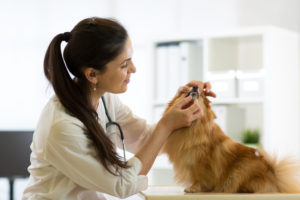Become a Veterinarian- A Summary
Veterinarians are a vital part of the health care system and are involved in many important aspects of animal health care. They perform surgeries, treat wounds, prescribe medications, and euthanize sick animals. Some veterinarians even perform research. These professionals study diseases and develop new treatment options. In addition to providing medical care, veterinarians also manage public health programs. Cat Vet near me
 A veterinarian is responsible for treating all types of animals and is trained to use modern medical equipment. They may also perform surgical procedures or conduct dental work on animals. Depending on their experience, veterinarians work in different environments, from hospitals and private practices to farms and government service. They are also trained to educate pet owners on preventive care for their animals.
A veterinarian is responsible for treating all types of animals and is trained to use modern medical equipment. They may also perform surgical procedures or conduct dental work on animals. Depending on their experience, veterinarians work in different environments, from hospitals and private practices to farms and government service. They are also trained to educate pet owners on preventive care for their animals.
Many veterinarians are leaders in their communities. They are often very compassionate and have a servant’s heart. They may participate in community service organizations, teach Sunday school, or serve in government or wildlife management groups. In addition, they may even be contracted by farming organizations or zoos. This variety of work environments requires veterinarians to learn basic management skills.
Depending on the state, veterinarians must pass state and national-level exams before becoming licensed. Most states require veterinary graduates to take the NAVLE, but some states also recognize a few additional state exams. In addition to passing a national exam, veterinarians may also pursue specialty certifications from different boards.
Veterinary students spend the first few years studying animal health and disease prevention. The final year of their four-year program includes clinical rotations in a veterinary medical center. Before practicing, however, a veterinarian must be licensed. While this requirement may vary from state to state, it is usually required that a vet graduate complete an accredited veterinary school and pass the NAVLE.
The Veterinary Medical Association (AVMA) recognizes 30 accredited veterinary schools. As of 2013, 6,800 applicants competed for 2,700 spots. Admission requirements for each veterinary school differ slightly, so it is important to understand the prerequisites for admission and decide on the course that suits your skills and interests. If you have a passion for animals, volunteer in a veterinary clinic or animal shelter as a volunteer.
Working in public health is another important area of veterinarian practice. These professionals help prevent animal and human diseases. They also help ensure that food and water are safe for consumption. They can also investigate the causes and consequences of epidemics. For example, veterinarians working in the Environmental Protection Agency can investigate the impact of pollutants on humans and animals. Other veterinarians work at the Food and Drug Administration to test medical products and food and water supplies.
Pre-veterinary courses should focus on the sciences. Most veterinary schools require at least one year of university-level science courses and college-level calculus. Individual schools may require additional coursework such as introduction to animal science, livestock judging, animal nutrition, cell biology, and genetics.